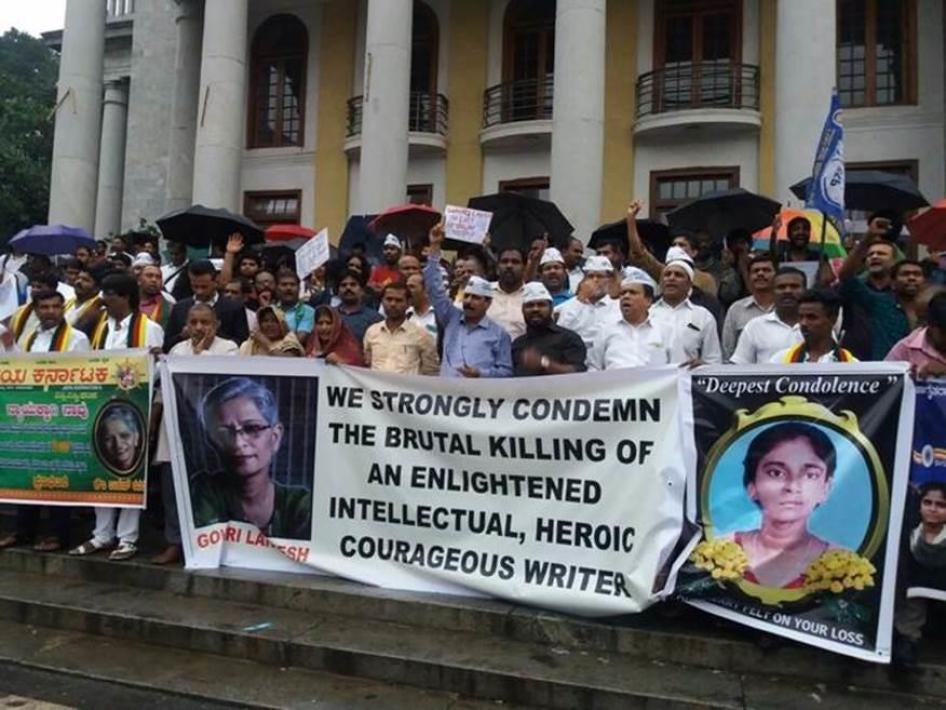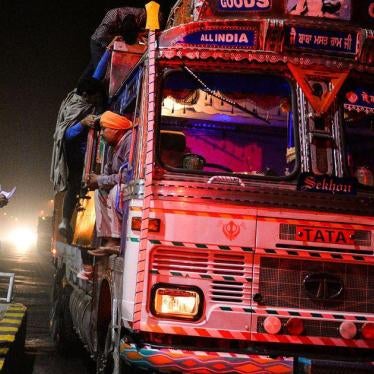(New York, September 6, 2017) – Indian authorities should promptly act on the announced investigation into the killing of an outspoken journalist by unidentified gunmen in Bengaluru on September 5, 2017, Human Rights Watch said today. Gauri Lankesh, 55, campaigned for democracy, secularism, and civil liberties and was a vocal critic of militant Hindu nationalism promoted by supporters of Prime Minister Narendra Modi’s Bharatiya Janata Party (BJP).
“The motives for Gauri Lankesh’s killing are not yet known, but the possibility of a politically motivated shooting needs to be fully and promptly investigated,” said Meenakshi Ganguly, South Asia director at Human Rights Watch. “Authorities in India need both to bring Lankesh’s killers to justice and to protect media freedom and the right to free expression.”
Lankesh was the publisher and editor of Gauri Lankesh Patrike, a Kannada-language weekly. She previously worked for several leading publications in India. Witnesses reported that she was fatally shot outside her home. Police said that the gunmen on motorbikes fired seven bullets at Lankesh as she was walking into her home from the front gate after returning from work at about 8 p.m. The gunmen escaped.
The state government of Karnataka has announced that a Special Investigative Team headed by an inspector general of police would investigate the killing. It added that the police have secured footage from closed circuit television installed in Lankesh’s home. The state government should ensure that the investigation is carried out in an impartial, time-bound manner, Human Rights Watch said.
In November 2016, Lankesh was convicted for criminal defamation for an article she had published in 2008 against BJP leaders Prahlad Joshi and Umesh Dhusi. She was sentenced to a fine and six months in prison, but was immediately granted bail after she filed an appeal.
In a May 2016 report, Human Rights Watch documented ways in which overbroad or vaguely worded criminal laws, including criminal defamation, are used to stifle political dissent and harass journalists. Indian interest groups claiming to be “offended” also use the laws to restrict activities by nongovernmental organizations, arbitrarily block internet sites or take down content, and target religious minorities and marginalized communities – particularly Dalits. These groups have often used threats and even physical attacks to harass those whose views they do not like.
Indian authorities have yet to properly prosecute those responsible for the killings of progressive writers and activists Govind Pansare, Narendra Dabholkar, and M.M. Kalburgi. All three men were allegedly killed by Hindu militant nationalists. The Bombay High Court said in August 2017 after the investigative agencies submitted reports in the Pansare and Dabholkar murder cases that “the reports reveal that these were clearly not one or two stray incidents. Certain organisations must be backing them, helping them financially. These incidents were well planned.” The court also expressed that it was “very unhappy” over the lack of progress in the investigations.
Lankesh’s killing also comes amid growing incidents of vigilante violence in India. Since 2012, there has been a spate of brutal attacks against Muslims and Dalits over rumors that they sold, bought, or killed cows for beef. Instead of taking prompt legal action against the vigilantes, many linked to extremist Hindu groups affiliated with the ruling BJP, too often the police have filed complaints against the assault victims, their relatives, and associates under laws banning cow slaughter. In the first seven months of 2017, there were 26 such attacks, and seven people were killed.
“Indian artists and writers have previously launched powerful campaigns to protest assaults on free expression, including by returning their national awards, leading to a country-wide conversation on intolerance,” Ganguly said. “People have the right to pursue their own brand of faith and patriotism, but the government should ensure that these are not forced upon others through threats and violence.”
|
News Release
India: Ensure Full Inquiry into Journalist’s Murder
Killing of Gauri Lankesh Puts Free Expression at Risk
Your tax deductible gift can help stop human rights violations and save lives around the world.
Most Viewed
-
November 25, 2019
A Dirty Investment

-
June 3, 2025
“They’re Ruining People’s Lives”

-
December 21, 2023
Meta’s Broken Promises

-
January 25, 2024
“We’re Dying Here”

-
February 19, 2018
“All We Want is Equality”




